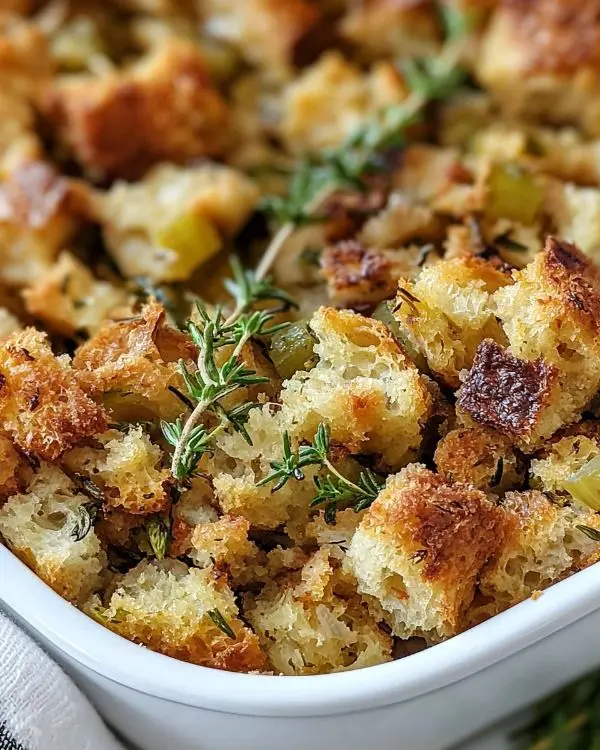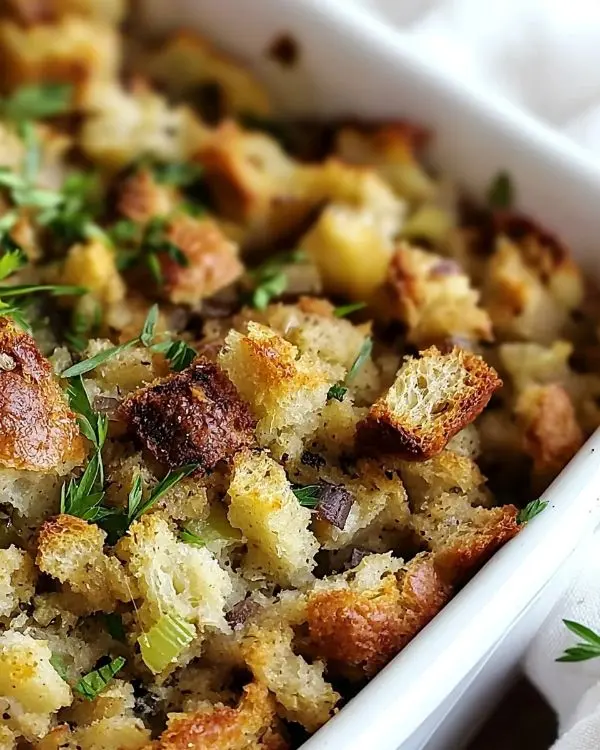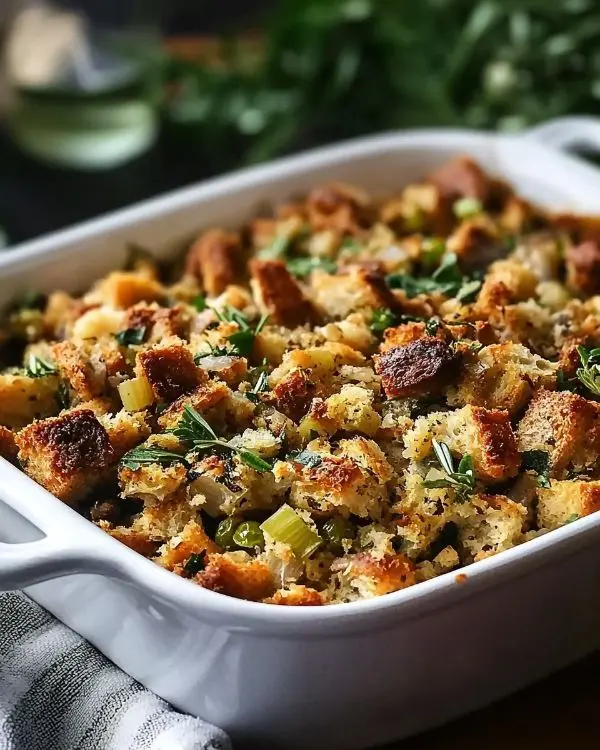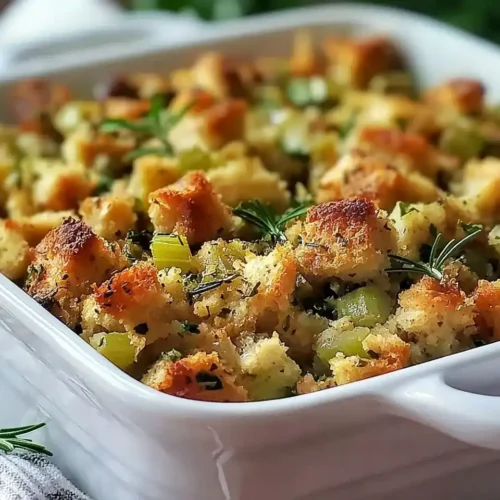Grandma’s Thanksgiving Stuffing Recipe delivers perfect texture and flavor. Learn easy homemade stuffing secrets with this tested family recipe
Hi, I’m Linda, and welcome to Tasty at Home—where bold flavors meet everyday kitchens. Let me tell you, nothing transports me faster to my grandmother’s farmhouse kitchen than the aroma of sage and butter dancing together in her old cast-iron skillet.
Well, it was three Thanksgivings ago when disaster struck. Moreover, my store-bought stuffing turned out soggy and lifeless, leaving twenty guests staring at their plates in disappointment. That’s when I knew something had to change.
Consequently, I spent months perfecting Grandma’s Thanksgiving stuffing recipe, testing different bread types and moisture levels until I cracked the code. Furthermore, this easy homemade stuffing recipe has transformed countless holiday meals since then. You know what makes this version special? The secret lies in achieving that perfect balance between crispy top and tender center that made my grandmother’s version legendary.
Table of Contents
What Makes This The Best Thanksgiving Stuffing Recipe

This isn’t just any stuffing recipe. Indeed, Grandma’s approach combines time-tested techniques with modern convenience to create something truly extraordinary.
First, we use day-old sourdough bread because its tangy flavor profile complements the herbs beautifully. Additionally, the bread’s structure holds up perfectly against the warm broth without becoming mushy. Man, oh man, the texture difference is remarkable!
Here’s what sets this recipe apart from others:
- Perfect moisture balance: No soggy bottoms or dry patches
- Restaurant-quality herb blend: Fresh sage, thyme, and rosemary create depth
- Customizable consistency: Adjust broth gradually for your preferred texture
- Make-ahead friendly: Prep components days in advance
Essential Ingredients for Perfect Stuffing
| Ingredient | Amount | Purpose | Shopping Tips |
|---|---|---|---|
| Sourdough bread (cubed) | 10 cups | Base structure | Choose day-old loaves from bakery section |
| Yellow onion | 1 large | Aromatic foundation | Look for firm, papery skin |
| Celery | 2 cups chopped | Textural contrast | Bright green stalks, no brown spots |
| Fresh sage | 2 tablespoons | Primary herb flavor | Velvety leaves, avoid wilted ones |
| Fresh thyme | 2 tablespoons | Earthy complexity | Small, intact leaves |
| Fresh rosemary | 1 tablespoon | Pine-like brightness | Firm, needle-like leaves |
| Low-sodium broth | 4 cups | Moisture and flavor | Chicken or vegetable work equally well |
| Unsalted butter | ½ cup | Rich binding agent | European-style for extra richness |
| Salt and pepper | To taste | Seasoning balance | Fine sea salt preferred |
Bold Add-ins and Creative Variations
Transform your basic stuffing into something spectacular with these tested additions:
- Dried cranberries: 1 cup for sweet-tart bursts
- Toasted pecans: ¾ cup chopped for crunch
- Italian sausage: 1 pound cooked and crumbled
- Mushrooms: 2 cups sautéed mixed varieties
International Substitutions
For readers outside the US, here are equivalent ingredients:
- Sourdough bread: Use crusty white bread or pain de campagne
- Low-sodium broth: Reduce-salt stock or homemade version
- Fresh herbs: Dried herbs work (use ⅓ the amount)
Equipment and Preparation Mastery
Essential Equipment for the Best Thanksgiving Stuffing
You don’t need fancy gadgets for this recipe. However, having the right tools makes the process smoother:
Must-Have Items:
- Large mixing bowl (at least 6-quart capacity)
- 9×13 inch baking dish
- Large skillet for sautéing
- Sharp chef’s knife
- Wooden spoon for gentle mixing
DIY Alternatives:
- No large skillet? Use a wide saucepan instead
- Missing mixing bowl? Clean roasting pan works perfectly
- No baking dish? Disposable aluminum pans are fine
How To Make Stuffing From Scratch
Step 1: Prepare Your Bread Foundation
Preheat your oven to 350°F (175°C). Meanwhile, cube your sourdough into 1-inch pieces. If your bread is fresh, spread cubes on baking sheets and toast for 10 minutes until slightly crispy. This prevents soggy stuffing later.
Pro Tip: Day-old bread works best because it absorbs liquid without falling apart.
Step 2: Create the Aromatic Base
Melt butter in your large skillet over medium heat. Next, add diced onions and celery, stirring frequently. Cook for 5-7 minutes until vegetables soften and onions become translucent. The kitchen should smell absolutely divine at this point!
Julia Child always emphasized cooking onions until they’re “sweetened” – this caramelization adds incredible depth.
Step 3: Build Flavor Layers
Season your sautéed vegetables lightly with salt and pepper. Then, add your chopped fresh herbs, stirring for another minute to release their essential oils. This step is crucial for distributing flavors evenly throughout your stuffing.
Common Mistake Alert: I once added herbs too early and they turned bitter. Add them at the end of sautéing for best results.
Step 4: Combine and Moisten
Place bread cubes in your large mixing bowl. Pour the hot vegetable mixture over them, tossing gently with a wooden spoon. Gradually add warm broth, starting with 3 cups and adding more as needed. The mixture should be moist but not soggy.
Sensory Indicator: Properly moistened stuffing feels like wet sand that holds together when squeezed.
Step 5: Bake to Golden Perfection
Transfer stuffing to your greased baking dish. Cover tightly with aluminum foil and bake for 30 minutes. Remove foil and continue baking 15 minutes until the top turns golden brown and slightly crispy.
Temperature Check: Internal temperature should reach 165°F for food safety.

Expert Tips and Variations for Success
Professional Secrets for Perfect Results
After testing this recipe extensively, these tips guarantee success every time:
Moisture Management: Start with less broth than you think you need. You can always add more, but you can’t take it back once it’s soggy.
Texture Contrast: Leave some bread pieces slightly larger for interesting texture variation throughout your stuffing.
Timing Strategy: Prepare components up to two days ahead. Store bread cubes and sautéed vegetables separately, then combine on cooking day.
Regional American Variations
Transform this base recipe to match different regional preferences:
Southern Style: Add 1 cup cornbread cubes and ½ cup chopped green onions New England Twist: Include 1 cup chopped apples and ½ cup dried cranberries California Fresh: Fold in ¼ cup chopped fresh parsley and 2 tablespoons lemon zest Midwest Comfort: Mix in 1 pound cooked, crumbled breakfast sausage Southwest Kick: Add ¼ cup chopped green chiles and 1 teaspoon cumin
Storage and Make-Ahead Instructions
| Storage Method | Duration | Instructions |
|---|---|---|
| Refrigerated (cooked) | 3-4 days | Cover tightly, reheat at 350°F |
| Frozen (cooked) | 2 months | Wrap in foil, thaw overnight before reheating |
| Prepped components | 2 days | Store bread and vegetables separately |
| Assembled (uncooked) | 1 day | Cover and refrigerate, bring to room temp before baking |
Perfect Pairings and Serving Suggestions
This stuffing pairs beautifully with traditional Thanksgiving favorites. Furthermore, it complements our famous roast turkey recipe perfectly.
Consider serving alongside cheesy root vegetable gratin for a complete holiday spread. Additionally, the herbs in this stuffing echo beautifully with roasted Brussels sprouts or green bean casserole.
For wine pairings, choose a medium-bodied Pinot Noir or crisp Sauvignon Blanc to complement the herb flavors without overwhelming them.
Grandma’s Thanksgiving Stuffing FAQs
What are the ingredients in Thanksgiving stuffing?
Traditional Thanksgiving stuffing contains bread, onions, celery, herbs (sage, thyme, rosemary), broth, and butter. Some recipes include eggs, but this version achieves perfect texture without them.
What is the secret to good stuffing?
The secret to good stuffing lies in proper moisture balance and using day-old bread. Additionally, sautéing vegetables until soft and sweet creates the flavor foundation that makes stuffing memorable.
What are common stuffing mistakes to avoid?
Common stuffing mistakes include using fresh bread (causes sogginess), adding too much liquid at once, and not seasoning vegetables properly. Also, avoid packing stuffing too tightly in the baking dish.
Is there a difference between turkey stuffing and turkey dressing?
Yes, technically stuffing cooks inside the turkey cavity while dressing bakes separately in a casserole dish. However, food safety experts recommend cooking stuffing separately, so the terms are often used interchangeably today.
Creating Your Own Thanksgiving Tradition

Oops! Almost forgot the most important part – making this recipe your own family tradition.
This easy homemade stuffing recipe represents more than just a side dish. Indeed, it connects us to generations of family gatherings and shared memories. Furthermore, every time you make this recipe, you’re creating new traditions for future generations to cherish.
Last Thanksgiving, my teenage nephew declared this “way better than the boxed stuff” – high praise from a kid who usually lives on takeout! Moreover, watching family members reach for seconds (and thirds) reminded me why I spent those months perfecting every detail.
Whether you’re hosting your first Thanksgiving or your fiftieth, this recipe delivers consistent results that bring people together. The combination of crispy edges and tender center creates exactly the texture contrast that makes great stuffing unforgettable.
Try pairing it with Japanese ginger salad for an unexpected fusion twist, or keep it traditional alongside classic holiday sides. Either way, you’re guaranteed to create memories that last long after the last bite.
Share your stuffing success stories with us on social media – we love seeing how you make this recipe your own! Tag us with your holiday table photos because nothing makes us happier than bringing families together around amazing food.

Grandma’s Thanksgiving Stuffing Recipe
Equipment
- Large mixing bowl
- 9×13 inch baking dish
- Large skillet
- Sharp chef’s knife
- wooden spoon
Ingredients
Main Ingredients
- 10 cups Sourdough bread, cubed day-old preferred
- 1 large Yellow onion diced
- 2 cups Celery chopped
- 2 tablespoons Fresh sage chopped
- 2 tablespoons Fresh thyme chopped
- 1 tablespoon Fresh rosemary chopped
- 4 cups Low-sodium broth chicken or vegetable
- ½ cup Unsalted butter melted
- Salt and pepper to taste
Instructions
- Preheat oven to 350°F (175°C). Cube sourdough bread and toast for 10 minutes if fresh.
- Melt butter in a large skillet. Sauté diced onion and celery for 5–7 minutes until soft.
- Add chopped herbs, stir for 1 minute to release aroma. Season lightly with salt and pepper.
- Combine bread cubes and vegetable mixture in a large bowl. Gradually add broth until moist but not soggy.
- Transfer to greased baking dish. Cover with foil and bake 30 minutes, then uncover and bake 15 minutes more until golden brown.

